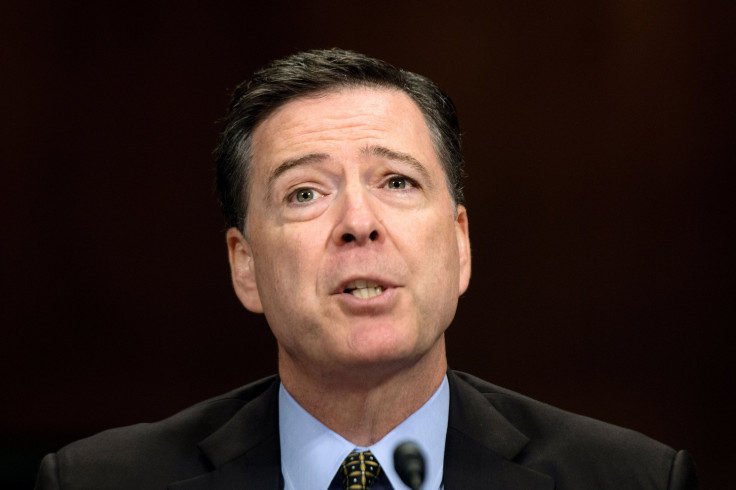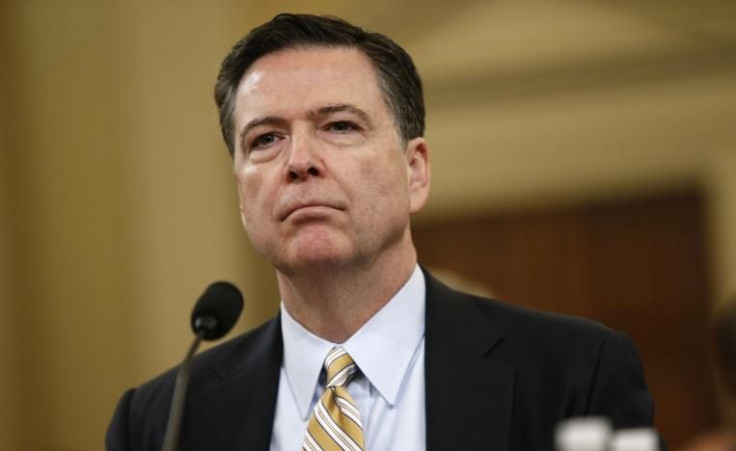Did Former FBI Director James Comey Make Enemies With Donald Trump, Hillary Clinton, Others?

Prior to his abrupt firing in May by President Trump, former FBI Director James Comey had been known for engaging in high-profile conflicts with top government officials. When he testifies Thursday before the Senate Select Committee on Intelligence about his interactions with Trump, some will likely be reminded of his many publicized decisions before and during his time as head of the FBI.
Despite his often affable personality, Comey's has made adversaries on both sides of the political aisle. Eleven days before the 2016 presidential election, Comey raised eyebrows when decided to reopen the case against Hillary Clinton over her handling of classified information on her email server as secretary of state during the Obama administration.
He would once again close the case, but to Clinton and her supporters the damage was already done. In May, Clinton told CNN anchor Christiane Amanpour at a Women for Women International event in New York that "if the election had been on October 27, I would be your president."
Comey would later turn his focus to the Trump campaign and its possible coordination with Russia ahead of the election. In March, Comey confirmed to the House Intelligence Committee that an investigation was underway into whether Russia interfered with the election and whether Trump officials communicated with Moscow officials. He also affirmed that there was “no information” to support Trump’s allegation that President Barack Obama wiretapped him.
But there has been more to Comey's nearly four years in office that just dealing with Clinton and Trump.
Comey As A Prosecutor
In 1996, Comey served as Deputy Special Counsel of the Special Committee to Investigate Whitewater Development Corporation, investigating allegations that President Bill Clinton and Hillary Clinton were involved in a fraudulent Arkansas land deal.
In 2003, he brought charges against celebrity businesswoman and television personality Martha Stewart of conspiracy, obstruction of justice and securities fraud linked to selling stock in ImClone Systems, a biopharmaceutical company. Stewart was ultimately convicted on all counts and sentenced to five months in prison in West Virginia.
Bush Wiretapping
One highly publicized testimony involved Comey when he served as deputy to Attorney General John Ashcroft. In March 2004, he confronted top members of the Bush administration in a showdown over illegal wiretapping.
Ashcroft was recovering from gallbladder surgery at a Washington hospital when White House Counsel Alberto Gonzales and President Bush's chief of staff Andrew Card showed up to persuade the attorney general to reauthorize Bush's domestic surveillance program, which the Justice Department had just determined was illegal.
Comey raced to the hospital to head off Gonzales and Card. However, when Comey made it to his side, Ashcroft made it clear he would not grant his approval for the program.
"I was angry," Comey told Congress in May 2007. "I thought I just witnessed an effort to take advantage of a very sick man, who did not have the powers of the attorney general because they had been transferred to me."
READ: Bar Celebrates 'Comey Hearing Covfefe' With 'Russian Vodka Flavors'
FBI Director In The Obama Administration
By the time President Obama nominated him as the FBI director in 2013, Comey had developed a strong reputation as a straight-shooting non-partisan investigator, leading to an overwhelming 93-1 confirmation by the Senate.
He continued to buck partisan norms as FBI Director, making controversial statements about everything from waterboarding, racial profiling, to the Holocaust.
In July 2013, Comey took a hard stance against waterboarding, defining it as "torture," "illegal," and outlined to lawmakers how he had bold reservations over the Bush administration's endorsement of the practice.
"When I first learned about waterboarding, when I became deputy attorney general, my reaction as a citizen and a leader was: This is torture. It's still what I think," Comey told Sen. Patrick Leahy of Vermont at his confirmation hearing before the Judiciary Committee.
READ: Comey Testimony Could Include Trump Conversations But Not FBI's Russia Investigation Details
In February 2015, Comey made a speech at Georgetown University that condemned police brutality and addressed the "hard truths" of the lessons learned from violence between "communities of color" and the police in Ferguson, Missouri.
"Unfortunately in places like Ferguson, in New York City and in some communities across this nation, there is a disconnect between police agencies and the citizens they serve, predominately in communities of color," Comey said. "Serious debates are taking place about how law enforcement personnel relate to the communities they serve, about the appropriate use of force."
He also contradicted the Obama administration when he said that there was a "Ferguson effect." Comey claimed that police officers getting caught in viral YouTube videos hindered their response to violent crime and resulted in an uptick in crime.
In April 2015, he made a controversial speech at the U.S. Holocaust Memorial Museum referring to the "murderers and accomplices of Germany, and Poland, and Hungary, and so many, many other places" during World War II, which the President of Poland Bronislaw Komorowski called "an insult to thousands of Poles who helped Jews."
Comey vs. Silicon Valley And Privacy
In October 2014, Comey argued against Apple and Google encrypting smartphones data to prevent accessibility to law enforcement.
"We’re seeing more and more cases where we believe significant evidence is on that phone or a laptop, but we can’t crack the password," Comey said in a speech at the Brookings Institute. "If this becomes the norm, I would suggest to you that homicide cases could be stalled, suspects could walk free, and child exploitation might not be discovered or prosecuted. Justice may be denied, because of a locked phone or an encrypted hard drive."
In February 2016, Comey wanted to have the unlocked iPhone of one of the terrorist shooters in San Bernardino, California, that left 14 dead and 22 injured, with Apple refusing to cooperate with the FBI.
"The San Bernardino litigation isn’t about trying to set a precedent or send any kind of message,” Comey wrote in a national security blog. "We simply want the chance, with a search warrant, to try to guess the terrorist’s passcode without the phone essentially self-destructing and without it taking a decade to guess correctly. That’s it. We don’t want to break anyone’s encryption or set a master key loose on the land."

© Copyright IBTimes 2024. All rights reserved.




















